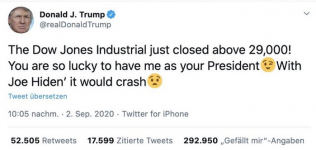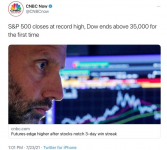- Despite his concerns, Summers told Axios he doesn't think the $1.2 trillion "hard" infrastructure package being negotiated in Congress will increase inflation.
The other side: The good political news for Biden is that voters aren't yet directly blaming him for rising costs.
Lake and two other Democratic pollsters told Axios that voters are still mostly attributing the higher costs to pandemic-related supply chain problems rather than an overheated economy caused by Biden overspending.
- That view is bolstered in public polls. Some 27% of respondents in an Ipsos poll said they blamed COVID-related supply chain issues for rising prices.
- And while inflation might rise the rest of the year, Democrats are more confident it will be retreating in the fall of 2022, when voters head to the polls.
I attended college beginning in 1979, and by 1981 I was taking upper-level economics courses. Economists as of 1979-1980 simply could not figure out why the nation was suffering 10%, 11%, 12% inflation. I wager a lot on this forum don't even remember those times.
Milton Friedman had been warning for years that uncoupling the dollar from gold, accompanied with massive government spending that we saw in the 1960's with the "war on poverty" and Medicare, simply overwhelmed the economy with one good and drove its value into the toilet - the dollar. Think of the dollar as just another good, like apples or mufflers. If the supply of apples or mufflers increases substantially, with no concomitant increase in the demand, the relative value or cost of apples or mufflers falls and will fall significantly if the supply increases substantially.
How do we measure the increased cost of apples or mufflers? By comparing how much of a fixed value - dollars - it takes to acquire the product. Now if instead the supply of apples and mufflers remains the same, but the supply of dollars increases massively with no concomitant increase in production elsewhere in the economy to offset that increase in the supply of dollars, the value of the dollar falls compared to the value of apples, for example.
That is known as inflation, and is triggered by massive increases in the money supply when the government "monetizes the debt" by simply borrowing while pouring trillions of unbacked dollars into the economy with nowhere for the money to go, since production has not changed. The ONLY reason the United States does not experience runaway inflation, 30% or more, is that following Bretton Wood in 1948, the dollar is the world's currency. As a result, the overall supply of dollars in the world economy is so MASSIVE that the production of even three or four trillion dollars will not trigger inflation.
When we get to six, seven, eight trillion unbacked dollars, the supply increase effects the value of the dollar, driving it down - i.e., inflation. If the dollar ever stops being the world currency - no, WHEN the dollar stops being the world currency since the change always happens with the decline of empires - then we will see devastating inflation.
Also, "backing" the dollar with gold will not solve the problem. Some pretty cool research has shown that in fact the dollar's value remains somewhat consistent compared to the value of gold. We tend to believe that during problematic economic times, the "value" of gold increases, but I think what happens instead is that the value of the dollar falls so it takes more of those to get the same amount of gold. The value of gold has not changed; the value of the dollar has simply declined.
When inflation gets to be greater than 4% or so, interest is going to move up. Interest rates are generally inflation plus 3.5%, so 4% inflation = 7.5% interest. That obviously adversely affects the housing market, a huge engine in the economy, as home loans go from 2.6% fixed 30-year, to 5% for 30-year, cutting out a large segment of borrowers.
Government almost invariably reacts by spending more money because politicians are among the stupidest people ever to walk the earth.







